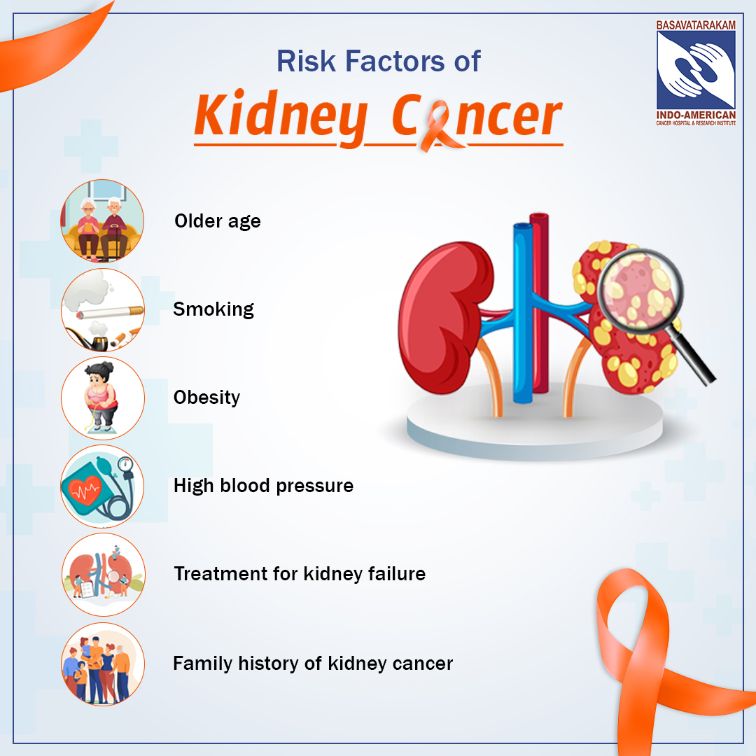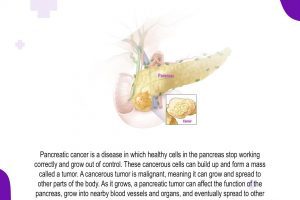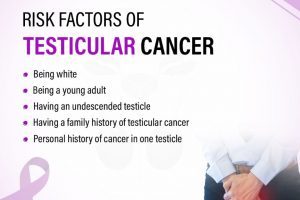Kidney cancer, also known as renal cancer, is a type of cancer that starts in the cells of the kidney. The kidneys are bean-shaped organs located under the ribcage on both sides of the spine. Their main function is to filter out toxic waste products from the blood and excrete them as urine. When the cells of the kidney grow and divide uncontrollably, they can form a tumor, which may or may not be cancerous.
Types of Kidney Cancer:
There are several types of kidney cancer, but the most common type is renal cell carcinoma (RCC), which accounts for about 90% of all kidney cancers. RCC originates in the cells that line the small tubes (tubules) within the kidney that filter waste from the blood and produce urine. There are several subtypes of RCC, including clear cell RCC, papillary RCC, chromophobe RCC, and others.
Another type of kidney cancer is transitional cell carcinoma (TCC), also known as urothelial carcinoma, which originates in the cells of the renal pelvis, the area of the kidney where urine collects before it passes to the bladder. TCC is less common than RCC and is usually associated with a history of smoking.
Less common types of kidney cancer include Wilms tumor (usually affects children), renal sarcoma, and collecting duct carcinoma.
Causes and Risk Factors:
The exact cause of kidney cancer is unknown, but certain risk factors increase the likelihood of developing the disease. These risk factors include:
Smoking: Smokers are at a higher risk of developing kidney cancer than non-smokers.
Age: The risk of kidney cancer increases with age, with most cases diagnosed in people over 45 years of age.
Gender: Men are more likely to develop kidney cancer than women.
Obesity: People who are overweight or obese are at a higher risk of developing kidney cancer.
High blood pressure: Hypertension is a risk factor for kidney cancer.
Family history: People with a family history of kidney cancer are at a higher risk of developing the disease.
Exposure to certain chemicals: Exposure to certain chemicals, such as cadmium and organic solvents, has been linked to an increased risk of kidney cancer.

Symptoms:
In its early stages, kidney cancer may not cause any noticeable symptoms. However, as the tumor grows, it may cause one or more of the following symptoms:
-
Blood in the urine (hematuria)
-
Pain in the side or back that doesn’t go away
-
Lump or mass in the side or abdomen
-
Fatigue
-
Unexplained weight loss
-
Loss of appetite
-
Fever

Diagnosis:
If kidney cancer is suspected, several tests may be performed to confirm the diagnosis, including:
Urine tests: A urine test may be performed to check for blood or other abnormalities.
Blood tests: Blood tests can detect substances released by kidney cancer cells, such as erythropoietin (EPO), which can cause anemia.
Imaging tests: Imaging tests, such as CT scans, MRI, and ultrasound, can provide detailed images of the kidneys and help identify any abnormalities.
Biopsy: A biopsy involves removing a small sample of tissue from the kidney and examining it under a microscope to determine if it is cancerous.
Treatment:
The treatment of kidney cancer depends on several factors, including the stage of the cancer, the location of the tumor, and the overall health of the patient. It is important to seek medical attention if you experience any symptoms of kidney cancer or if you have any risk factors for the disease. Early detection and treatment can improve the chances of a successful outcome. Regular check-ups with a healthcare provider and a healthy lifestyle can also help reduce the risk of developing kidney cancer.
Here are the main treatment options for kidney cancer:
Surgery: Surgery is the most common treatment for kidney cancer. The type of surgery depends on the size and location of the tumor. A partial nephrectomy may be done to remove only the tumor and a small portion of the surrounding kidney tissue. If the tumor is large or has spread to other parts of the kidney, a radical nephrectomy may be necessary to remove the entire kidney, nearby lymph nodes, and surrounding tissue.
Radiation therapy: Radiation therapy uses high-energy radiation beams to kill cancer cells. It may be used after surgery to destroy any remaining cancer cells or to treat tumors that cannot be surgically removed. Radiation therapy is not commonly used as the primary treatment for kidney cancer, but it may be used in combination with other treatments.
Chemotherapy: While chemotherapy is not typically considered the primary treatment for kidney cancer, it can still be a valuable tool in fighting the disease. Chemotherapy uses powerful drugs to target and kill cancer cells, and while it may not be effective in all cases of kidney cancer, it can be used to shrink tumors before surgery or to treat cancer that has spread to other parts of the body. With the right approach and careful consideration, chemotherapy can be an important part of a comprehensive treatment plan for kidney cancer patients.
Targeted therapy: Targeted therapy is a newer type of cancer treatment that uses drugs to target specific molecules or proteins that are involved in the growth and spread of cancer cells. These drugs are designed to interfere with the signals that allow cancer cells to grow and divide, while minimizing damage to healthy cells. Targeted therapy may be used alone or in combination with other treatments.
Immunotherapy: Immunotherapy is a type of cancer treatment that uses drugs to boost the body’s immune system to fight cancer cells. These drugs help the immune system recognize and attack cancer cells. Immunotherapy may be used alone or in combination with other treatments.
Prevention:
While there is no surefire way to prevent kidney cancer, there are steps that individuals can take to reduce their risk of developing the disease. Here are some tips for kidney cancer prevention:
Quit smoking: Smoking is a major risk factor for kidney cancer, as well as many other types of cancer. Quitting smoking can significantly reduce your risk of developing kidney cancer.
Maintain a healthy weight: Obesity and excess body weight have been linked to an increased risk of kidney cancer. Maintaining a healthy weight through a balanced diet and regular exercise can help reduce your risk.
Control high blood pressure: High blood pressure is a risk factor for kidney cancer, among other health problems. Work with your healthcare provider to manage your blood pressure and keep it within a healthy range.
Stay hydrated: Drinking plenty of water can help keep the kidneys functioning properly and may help reduce the risk of kidney cancer.
Limit exposure to certain chemicals: Exposure to certain chemicals, such as asbestos, cadmium, and organic solvents, has been linked to an increased risk of kidney cancer. If you work with or around these chemicals, take appropriate safety measures to minimize your exposure.
Get regular check-ups: Regular check-ups with a healthcare provider can help detect kidney cancer early, when it is most treatable. Talk to your doctor about how often you should be screened for kidney cancer, especially if you have any risk factors for the disease.





